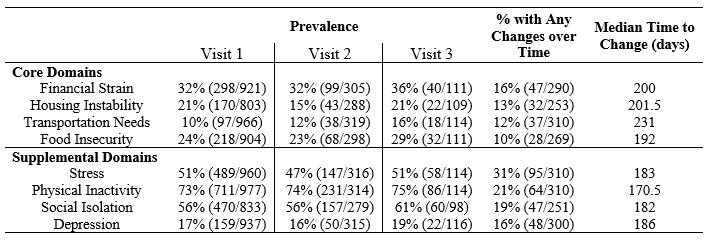Session Information
Session Type: Poster Session C
Session Time: 10:30AM-12:30PM
Background/Purpose: Social risk factors (SRFs) are associated with health outcomes, and patients with chronic conditions often report disproportionately higher rates of SRFs, complicating their disease management.1,2 Although SRFs change over time, the period over which these changes occur is not well-understood.3 Further, while routine screenings for SRFs are being incorporated in clinical settings, there are no data-driven guidelines for how often screenings should be conducted. Thus, this study aimed to evaluate the timing of SRF changes in a rheumatology outpatient population.1. Walker et al. Endocrine, 2014. doi: 10.1007/s12020-014-0195-02. Heller et al. Prev Med, 2021. doi: 10.1016/j.ypmed.2021.1067523. Xu et al. Med Care, 2021. doi: 10.1097/MLR.0000000000001441
Methods: Patients seen in Washington University School of Medicine’s Division of Rheumatology outpatient clinics were screened for SRFs between 1/1/2023 and 1/31/2025. Patients completed a standardized SRF screening questionnaire via mobile phones before their visit or iPads upon checking in, with responses automatically uploaded to the Epic electronic health record. Four core (financial resource strain, food insecurity, housing instability, and transportation instability) and four supplemental (physical activity risk, social isolation, stress, and depression) SRF domains were assessed and scored as “at risk” or “not at risk” based on existing Epic criteria. For patients with multiple visits during the study period, SRF data from all relevant visits were used. Descriptive statistics were used to summarize patient characteristics and SRF prevalence. Kaplan-Meier time-to-event analyses and change curves assessed time to changes in risk status for individuals with 2 or more screenings. Events were defined as any change in SRF status from “at risk” to “not at risk,” or vice versa. If no change was reported, patients were censored on their last SRF screening date during the study period.
Results: 992 patients (50% 40-64 years, 81% female, 31% Black) were screened for SRFs, with 322 (33%) screened more than once. Characteristics of patients with 2+ screenings were similar to those with only one, except for race (36% vs. 29% Black, respectively; Table 1). The prevalence of SRFs across visits remained fairly stable, with physical inactivity most prevalent (73%-75%) and transportation needs least prevalent (10%-16%) at all visits (Table 2). Only 10% of patients changed risk status for food insecurity compared to 31% for stress, and the median time to change ranged from 170.5 days for physical inactivity to 231.0 days for transportation needs (Table 2). Change curves (Figure 1) showed that stress was most likely to change over time, while the core SRF domains showed low probability of changes.
Conclusion: SRFs among rheumatology outpatients remained stable over time, with most patients reporting consistent SRF status for 6 months or more. Stress exhibits greater variability over time, while less than 25% of patients report changes in core SRF domains over 1 year. This work provides insight into how frequently SRFs should be screened and highlights the importance of incorporating interventions to address SRFs as part of clinical care.
 Table 1. Descriptive characteristics of the rheumatology outpatient population, stratified by number of total screenings, 2023-2025.x
Table 1. Descriptive characteristics of the rheumatology outpatient population, stratified by number of total screenings, 2023-2025.x
.jpg) Table 2. Prevalence of SRFs over time, proportion with any changes over time, and median time to event for change in SRF status
Table 2. Prevalence of SRFs over time, proportion with any changes over time, and median time to event for change in SRF status
.jpg) Figure 1. Change curves for all social risk factor domains
Figure 1. Change curves for all social risk factor domains
To cite this abstract in AMA style:
Lew D, Seidler L, Odom P, McQueen A, Williams J, Eisen S, Kim A. Characterizing the Frequency and Timing of Changes in Patient-Reported Social Risk Factors among Rheumatology Outpatients [abstract]. Arthritis Rheumatol. 2025; 77 (suppl 9). https://acrabstracts.org/abstract/characterizing-the-frequency-and-timing-of-changes-in-patient-reported-social-risk-factors-among-rheumatology-outpatients/. Accessed .« Back to ACR Convergence 2025
ACR Meeting Abstracts - https://acrabstracts.org/abstract/characterizing-the-frequency-and-timing-of-changes-in-patient-reported-social-risk-factors-among-rheumatology-outpatients/
